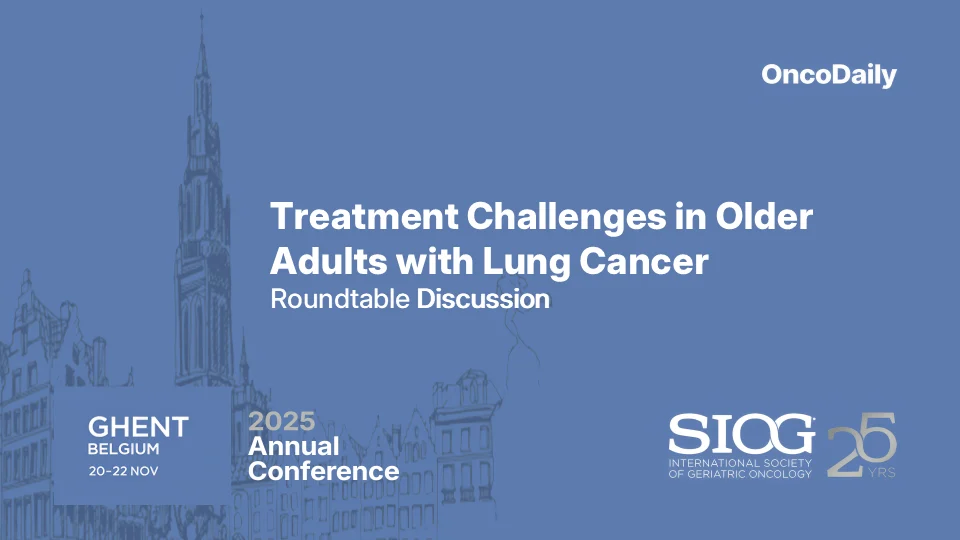Geriatric lung cancer care took center stage at the SIOG 2025 Roundtable Discussion “Perspectives on Complexities in Treatment Selection for Older Adults with Lung Cancer,” which brought together pulmonologists, oncologists, geriatricians, and supportive care specialists for a candid, case-based exploration of one of the most challenging areas in oncology. Chaired by Fabio Gomes (Manchester), the roundtable emphasized the nuanced decisions required when caring for older adults with lung cancer.
A Case-Based Roundtable on Geriatric Lung Cancer
The session revolved around a real clinical case of an older adult newly diagnosed with lung cancer. The case highlighted diagnostic uncertainty, comorbidity burden, functional limitations, and competing priorities that often shape treatment selection far beyond what guidelines alone reveal. Early symptoms, diagnostic findings, and initial management steps were presented to frame the discussion.
When Specialties See the Same Patient Differently
Under the moderation of Prof. Lore Decoster, panelists examined the case from pulmonology and geriatric oncology perspectives. The conversation showed how imaging choices, biopsy decisions, and risk stratification can diverge depending on the clinician’s specialty lens. It also illustrated how critical details — especially functional and psychosocial factors — may remain unspoken when geriatric insight is not part of multidisciplinary tumor board discussions.
Toxicity, Treatment Interruptions, and Lessons Learned
The patient’s treatment pathway served as a turning point. Systemic therapy had been initiated without a geriatric assessment, and the patient soon experienced significant toxicity that disrupted the plan. This opened a wider discussion on what might have been anticipated: frailty indicators, polypharmacy concerns, cognitive issues, or functional decline that routine oncology workups often miss. Panelists noted that many complications are predictable — and sometimes preventable — when geriatric principles guide decision-making.
Why Geriatric Assessment Changes the Trajectory
The session then focused on practical solutions. Siri Rostoft (Oslo) and Theodora Karnakis (São Paulo) outlined how geriatric assessment can be feasibly integrated into lung cancer care. Even brief screening tools help identify vulnerabilities that influence dosing decisions, treatment intensity, and supportive care needs. They emphasized that geriatric assessment is more than an “extra step” — it is a safety mechanism that leads to more individualized, realistic treatment plans.
Insights From Global Clinical Practice
Audience members from multiple regions shared reflections, describing cases where the absence of geriatric assessment led to overly aggressive therapy, avoidable toxicities, or missed opportunities for supportive care intervention. The discussion highlighted the shared global challenge of treating older adults with lung cancer who often present with overlapping medical, functional, and social issues.
Closing Message: Bridging the Gap in Lung Cancer Care
In his concluding remarks, Fabio Gomes returned to the central lesson of the roundtable: improving outcomes for older adults with lung cancer requires coordinated, multidisciplinary decision-making informed by geriatric principles. Diagnostics, treatment planning, and toxicity management must reflect the whole patient — not just the tumor. Integrating geriatric assessment, embedding structured pathways, and recognizing when a more measured approach may be safer are essential steps toward better care.
This roundtable made one thing clear: while complexity is unavoidable, thoughtful collaboration across disciplines can transform the treatment experience for older adults with lung cancer.
For more information click here.
